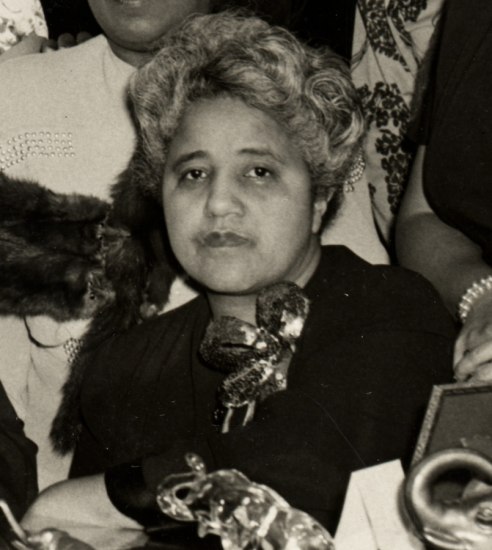26 Feb Black Women Helping Women: Marjorie Joyner’s Beauty Mark on the Community
Ladies, it’s still Black History Month, and we can’t stop celebrating the beauty of being black. Today, we’re highlighting another woman who propelled the beauty industry forward, especially within the black community: Marjorie Stewart Joyner.
Back in the day, while there were definitely strides happening within the hair community, they were rarely for women of color. Thankfully, a network of black women was able to take these new beauty items and improve them to meet the needs of our kinks and coils.
Interestingly enough, Joyner and Madam C.J. Walker (the she-ro of our last BHM profile) crossed paths early in her career which helped shape her future, giving us the true definition of a #girlgang.
A Little More About Marjorie Stewart Joyner

Born in 1896, Joyner was the granddaughter of a slave and white slave owner. She got her start in beauty at the young age of 16 at A.B. Molar Beauty School, where she became the first African-American to earn her cosmetology license from the institution. Joyner was no stranger to “firsts” – as she would eventually become the first Black woman to receive a U.S. patent for her Permanent Wave Machine.
After graduating with her license and marrying her husband, Joyner opened a salon on the South Side of Chicago. In school, Joyner was taught techniques primarily for styling white hair, so she decided to further her education by enrolling in one of Madam C.J. Walker’s schools. Her talent and backstory caught the attention of Madam C.J. Walker herself. This connection between the two women opened the door for Joyner to become the national adviser of Walker’s company and oversee her 200 beauty colleges after Walker’s death in 1919.
Throughout her lifetime, she not only advocated for the education of women of color but the overall betterment of race relations in America. By establishing multiple national organizations and working alongside Eleanor Roosevelt, Marjorie Joyner made an invaluable mark on the black community.
Her Inventions
Like most great things, Joyner’s invention started in the kitchen. While making a pot roast, she noticed that the pins that heated the meat from the inside may have another use in heat styling. She connected 16 long rods to an electrical cord on a dryer hood which would straighten hair while creating defined curls that lasted for days.
Until this point, straightening and curling black hair was a painstaking process utilizing the OG hot comb method (so, you know something had to give). Joyner made literal waves with her Permanent Wave Machine, gaining the attention women of all ethnicities and salons across the nation.
She even furthered her invention by creating and patenting a scalp protector to make the process less painful.
Unfortunately, Marjorie Stewart Joyner would not see the monetary profit from this invention as the rights were held by the Madam C.J. Walker company. But it’s clear from her activism that money was never her end goal.
Her Legacy
While black people have invented a myriad of things throughout history, its seldom the invention itself that puts them in the history books. For Marjorie Stewart Joyner, she will be fondly remembered for her dedication to the betterment of black lives:
- As an avid member of the Chicago community, Joyner organized the first annual Bud Billiken Day Parade in 1929. She continued to direct the parade for the decades following.
- In 1935, Marjorie Joyner and Mary Mcleod Bethune cofounded the National Council of Negro Women to unite black women and their communities.
- Throughout the 1930s and 40s, Joyner worked closely with Eleanor Roosevelt to better race relations. This led her to earn a women’s leadership position on the Democratic National Committee to liaise on behalf of black women.
- To improve the professional standards for beauticians, she established the Alpha Chi Pi Omega Sorority and Fraternity in 1945.
- The same year, Joyner formed the United Beauty School Owners and Teachers Association.
Marjorie Stewart Joyner’s accomplishments represent the power of our culture – but she is just one in a vast timeline of black leaders that continue to shape our futures. Learning more about these women shows the greatness that we can achieve regardless of background, gender or otherwise. We have hands in every aspect of every industry from electricity and medicine to beauty and music. So, if you ever needed a reason to find your passion and go hard chasing it, look to the past for inspiration.



